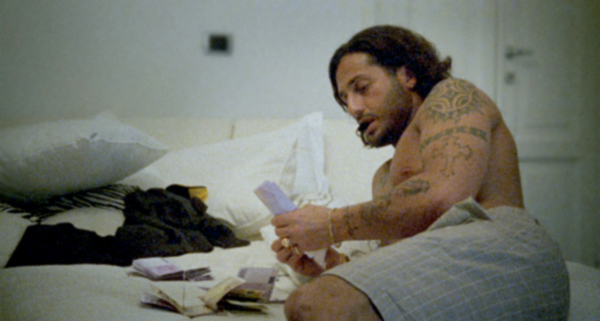|
Reviews of Recent Independent, Foreign, & Documentary Films in Theaters and DVD/Home Video

VIDEOCRACY Nowadays you don’t even need a gimmick, you just need to be seen on Italian TV to get ahead, according to director Erik Gandini, who singles out three men emblematic of the Italian bottom-of-the-barrel, celebrity-driven pop culture. When we first meet aspiring star Ricky Canevali, his only on-camera experience has been as an audience member. He knows he has to do something to stand out, especially from the showgirls, who often appear half-naked in barely-there g-strings. So for a TV talent show, Ricky performs a song channeling both the moves of Jean-Claude Van Damme and Ricky Martin. His presence in the film narrows down to one talking point: fame means everything. Powerful agent Lele Mora is first seen living the beautiful life on an island off of Sardinia surrounded by a bevy of male pulchritude. Like Ricky, he uses the camera as an audition, an opportunity to flaunt. A self-professed fan of Mussolini, Mora gleefully displays the Fascist hymns and film propaganda on his smart phone. Better to be offensive than forgettable, I guess. The film warns of forces willing not to follow the rules. Its case in point: Fabrizio Coruna, a former assistant to Mora and now a photo agent who sells back embarrassing Paparazzi photos to celebrities. Ah, the sweet stench of success. In an interview from the backseat of a limo, he claims he hates all the beautiful people covered by the gossip pages—his bread and butter—and that he’s a modern Robin Hood, stealing from the rich but keeping the money for himself. That he has also become a national celebrity is an irony not lost on him or Gandini. After he has been arrested for extortion and served an 80-day prison sentence, Corona reinvents himself into a paper gangster. Tanned and tattooed, he struts onto talk shows, with sunglasses and his hair slicked back into a ponytail. His cynicism could all be an act, one of the many poses he strikes. An all-out narcissist with apparently nothing to hide, he gives the camera complete access, baring all as he lathers up in the shower. The narrator, Gandini, intones that “the beginning of the cultural revolution” began 30 years ago with the emergence of Prime Minister Silvio Berlusconi’s media empire, which started out in a bar-turned-TV studio with a popular game show—if a caller answered a question correctly, the on-camera housewife would strip. Certainly the instant fame of reality TV and the fascination of the famous-for-being-famous isn’t insular to Italy. America has recently been assaulted by the likes of the Octomom, John and Kate, and the Balloon Boy. Less an
indictment than an obvious exposé, Videocracy is foreplay to
larger issues, a sideshow to the larger story of Berlusconi’s control of
the media. The mogul owns the majority of broadcast TV networks, and his
government controls the state broadcasting system, RAI. Just this week,
Variety reported that political content will be excised from RAI
talk shows for a month before regional elections in March, and both RAI
and Berlusconi's networks banned the trailer for Videocracy, with
RAI declaring that the film is “offensive
to the honor and personal reputation of the prime minister.” If
the claim that “television and power are one and the same” in Italy, as Giandini posits, then
he has only jiggled the surface. Kent
Turner
|

